- Markets, finance and governance
- Sanitation as a business and business models
- Progress so far ... Sanitation Service Delivery Program (PSI with PATH and WSUP, funded by USAID) - Ghana, Ivory Coast and Benin
Progress so far ... Sanitation Service Delivery Program (PSI with PATH and WSUP, funded by USAID) - Ghana, Ivory Coast and Benin
172k views
- USAIDssd
-
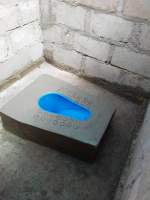
- SSD is a sanitation program funded by USAID, which aims to create sustainable sanitation market for the urban poor in Benin and Côte d'Ivoire. This market will elicit a demand for sanitation services and a reliable supply of high-quality sanitation products and services.
Less- Posts: 50
- Karma: 1
- Likes received: 9
Re: Sanitation Service Delivery Program in Ghana, Ivory Coast and Benin - Updates
On the occasion of the celebration of International Women's Rights Day around the world on March 8, several women's associations in the cities of Abidjan, Bouaké and Yamoussoukro organized a major awareness-raising ceremony for better access to sanitation in collaboration with the Sanitation Service Delivery urban sanitation project. In Côte d'Ivoire, according to the 2016 JMP report, only 36% of the population has access to a sanitation system. On the occasion of this commemorative day, the women advocated for better access to toilets and sanitation facilities. Lack of sanitation increases the risk of disease and malnutrition, especially for women and children. Women and girls face the risk of assault and rape because they do not have access to toilets that preserve their privacy. Since its implementation, the SSD project, with the support of the sector, has enabled the construction of nearly 2500 latrines in Côte d'Ivoire among low-income households.
Please Log in to join the conversation.
You need to login to reply- USAIDssd
-

- SSD is a sanitation program funded by USAID, which aims to create sustainable sanitation market for the urban poor in Benin and Côte d'Ivoire. This market will elicit a demand for sanitation services and a reliable supply of high-quality sanitation products and services.
Less- Posts: 50
- Karma: 1
- Likes received: 9
Re: Sanitation Service Delivery Program in Ghana, Ivory Coast and Benin - Updates
Please Log in to join the conversation.
You need to login to reply- USAIDssd
-

- SSD is a sanitation program funded by USAID, which aims to create sustainable sanitation market for the urban poor in Benin and Côte d'Ivoire. This market will elicit a demand for sanitation services and a reliable supply of high-quality sanitation products and services.
Less- Posts: 50
- Karma: 1
- Likes received: 9
“Initially, many people tried to discourage me by saying that it was a job for men, but I didn’t give up,” says Ayé Judith Bodou.
Dressed in her fluorescent green vest and protective helmet, Judith leads a team of nine workers, all men, building septic tanks, soak pits and toilets in Abidjan, Côte d’Ivoire. Among these workers are 3 masons, 3 plumbers and 3 assistants.
Judith is a trained plumber who decided to use her skills to become a sanitation entrepreneur. She is the only woman working under the socially marketed SaniPlus brand launched nationwide in 2018. The brand of adapted and quality sanitation products and services was developed and is supported by the USAID funded Sanitation Service Delivery (SSD) Project implemented across West Africa by Population Services International (PSI), PATH, and Water and Sanitation for the Urban Poor.
After attending a SaniPlus training, Judith decided to focus her business on fabricating and installing SaniPlus products. A few weeks later, the SaniPlus sales team referred her to a customer who wanted to install a soak pit for a household in Abobo to separate shower water from toilet water and reduce the need for frequent and expensive septic tank emptying services.
In one day, she moulded on location at the household the 7 concrete rings required for the soak pit construction completed 2 days when the rings had cured. The end-product met the SaniPlus quality standards, providing an environmentally safe and long-lasting sanitation solution. The client, Mr. Bakayoko Mamadou, is truly satisfied with the product and expects that it will save him money by making his septic tank fill more slowly and won’t have to pay to have it emptied every month as he did in the past. He even recommended Judith to his relative Ouedraogo Assata. At Ouédraogo’s house there was already a soak pit, but it wasn’t enough to meet the compound’s needs. After analysis, Judith suggested that she could connect a second soak pit to the existing system. Three days later,the work was completed, and the new pit was in use.
Thanks to Judith’s impeccable work and dedication, Mr. Bakayoko continued to promote SaniPlus soak pits in his neighbourhood. Judith’s expertise also helped Mr. Tindo Issouf’s family. In the past, his family used septic tank emptying services every two weeks to reduce the quantity of water in their septic tank. This frequent emptying was financially taxing on Mr. Tindo and his family. After learning about the SaniPlus soak pit, Mr. Tindo Issouf liked the idea of installing an infiltration pit next to the septic tank he owns.
In less than a week, Judith completed three Sani Plus jobs. Today, Judith is optimistic about the potential growth for her business and has expanded to conducting door-to-door sales and promotion visits to offer Sani Plus products and services to new clients. To date, she has built 23 soak pits in total. She is determined to take her business to the next level of success, and this time, with other women alongside her. “I intend to encourage other women who want to do something in the field of entrepreneurship so that we can build toilets and sanitation facilities together!”
Attachments:
-
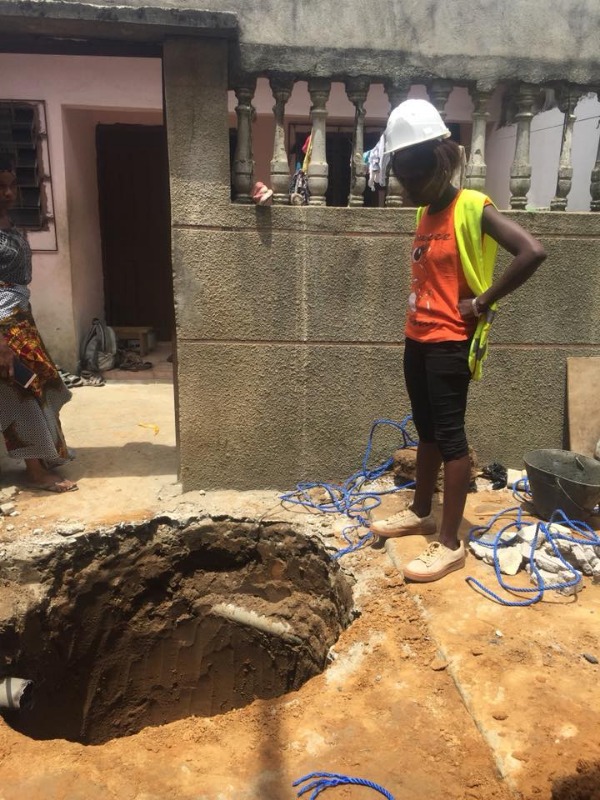 femaleentepreneur.jpg
(Filesize: 169KB)
femaleentepreneur.jpg
(Filesize: 169KB)
-
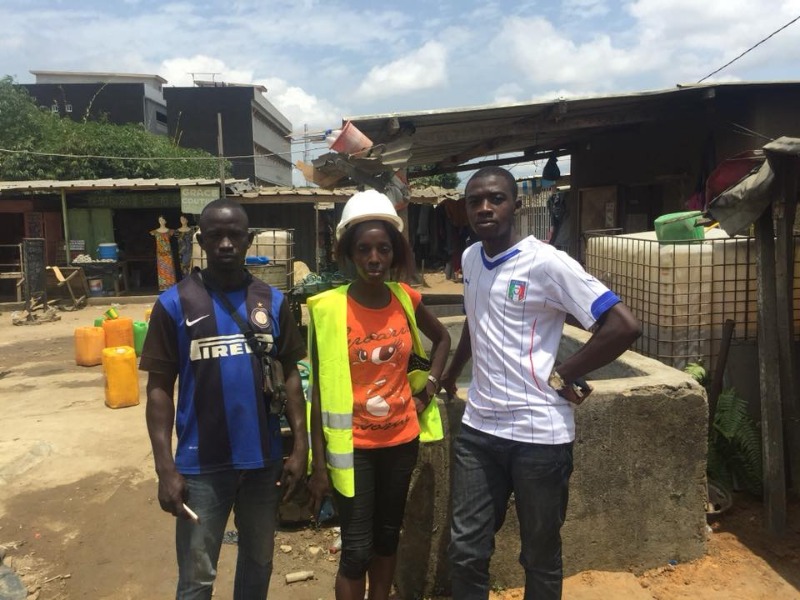 Femaleentr...sons.jpg
(Filesize: 132KB)
Femaleentr...sons.jpg
(Filesize: 132KB)
-
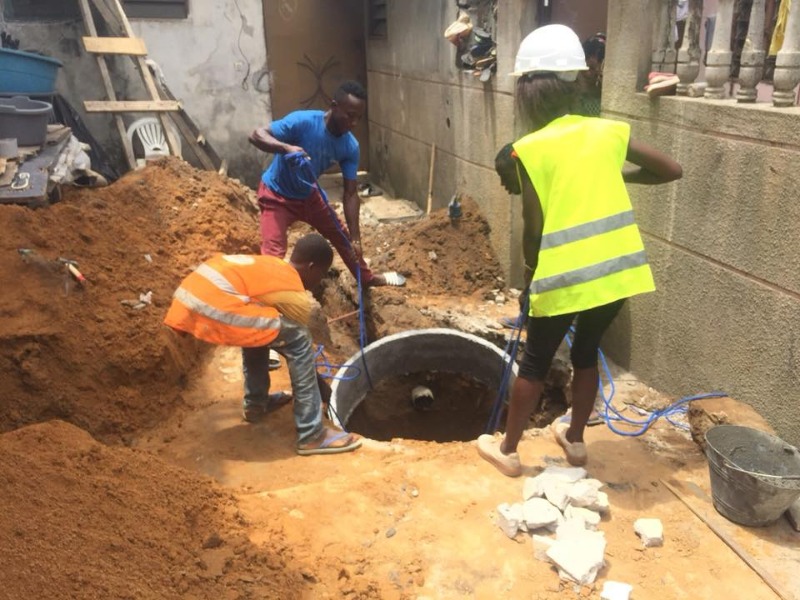 femaleentr...eur2.jpg
(Filesize: 141KB)
femaleentr...eur2.jpg
(Filesize: 141KB)
Please Log in to join the conversation.
You need to login to reply- USAIDssd
-

- SSD is a sanitation program funded by USAID, which aims to create sustainable sanitation market for the urban poor in Benin and Côte d'Ivoire. This market will elicit a demand for sanitation services and a reliable supply of high-quality sanitation products and services.
Less- Posts: 50
- Karma: 1
- Likes received: 9
In early 2017, Seydou Bakayoko faced every small business owner’s nightmare.
A new, industrial brick production company had just moved into his neighborhood, and his business selling pre-fabricated building materials couldn’t keep up with the competition. It was failing.
Seydou started his small business twenty years ago in Yopougon, a low-income neighborhood in Abidjan, Côte d’Ivoire. After working in many different small trades, he was able to save money and set up a small, informal brick-making enterprise called Bakayoko Services. His bricks were used by contractors as the construction sector in Abidjan continued to grow.
Bakayoko Services produced between 500 and 600 each week to sell to contractors, who purchased the bricks for their construction sites. Seydou could sell usually sell his entire weekly production of bricks in three days or less and took home a profit of up to US$52—a decent income for his family.
But Seydou’s success came to an abrupt halt when a large brick production company moved into Yopougon. With a high production capacity and sophisticated logistical support, the company took over the entire brick market in Yopougon – a hard blow for Bakayoko Services. Seydou’s customers disappeared and his profits dwindled; his once lucrative weekly production started to take a month to sell out.
After four months with his failing business in the red, Seydou was contacted by SaniPlus, a socially marketed brand of sanitation products and services. They were looking for manufacturers and entrepreneurs in Yopougon to scale up their business model, and wanted to use Bakayoko Services as a test site for the pre-fabrication of products.
At first, Seydou was hesitant. “The bricks didn’t work at first, and some of my masons threatened to leave,” he remembers. “So, I asked two masons to stay so that we could test the SaniPlus nozzles…After a few weeks, I received my first orders from customers. I realized [SaniPlus] was a good business.”
SaniPlus was developed as part of the USAID Sanitation Service Delivery (SSD) project, a regional urban sanitation project being implemented in Benin, Côte d’Ivoire, and Ghana by PSI in collaboration with PATH and Water and Sanitation for the Urban Poor (WSUP).
The SSD project provided Mr. Bakayoko with practical training and a starter kit to manufacture concrete rings used in the installation of septic tanks, infiltration soak pits and double pit leach latrines. Contractors who install SaniPlus soak pits and latrines come to Bakayoko Services to buy materials.
Once he started manufacturing SaniPlus products, Seydou was once again back in business. He began earning his previous weekly income of up to US$56—a living wage for Seydou and his family.
A few months after the launch of SaniPlus sales and promotion activities in Yopougon, the number of purchases increased, and the market for SaniPlus products is now steadily growing. Bakayoko Services receives orders for 3 to 4 soak pits per week, which translates to the creation of 28 new concrete rings. To better meet the demand for concrete rings, Bakayoko decided to double his production and train three of his workers to make the rings.
By the end of 2018, 78 soak pits were installed in homes across Yopougon, providing environmentally safe and long-lasting sanitation solutions to each new household. Bakayoko Services made 50 of the concrete rings used for these pits.
With the sanitation market continually growing, Bakayoko Services sees a promising future in concrete ring making.
“Today, thanks to SSD, many masons have changed the way they work. They use concrete rings to make wells now, instead of bricks, and they last much longer. I’m very happy,” Seydou gleams.
Attachments:
-
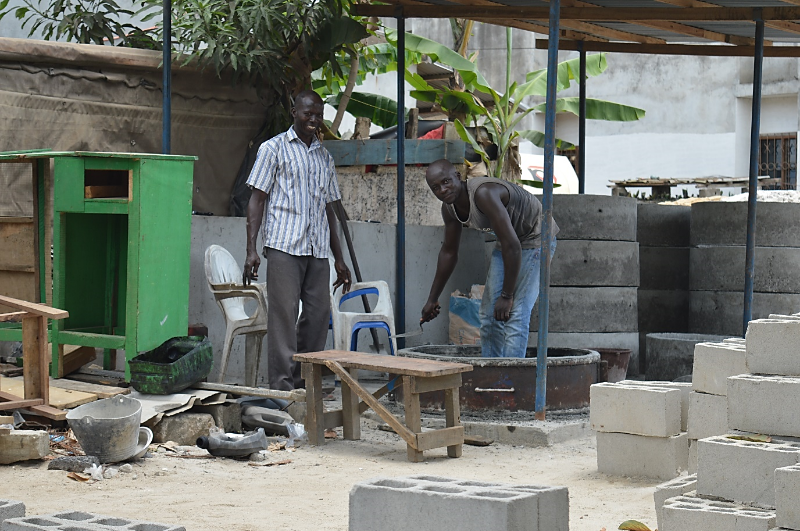 bakus.png
(Filesize: 855KB)
bakus.png
(Filesize: 855KB)
Please Log in to join the conversation.
You need to login to reply- Elisabeth
-
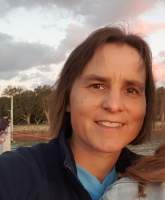
- Moderator
- Freelance consultant since 2012 (former roles: program manager at GIZ and SuSanA secretariat, lecturer, process engineer for wastewater treatment plants)
Less- Posts: 3372
- Karma: 54
- Likes received: 931
Re: Breaking down barriers: the story of a female entrepreneur
I have moved your post into the existing thread about your project ("Sanitation Service Delivery (SSD) Project") to keep it all together (is there a website link where people can find out more about this story?). I see the project is coming to an end in September this year, so there must be lots of results to share now?
Could you please provide an update to this (which was posted by you in November 2016):
• Current state of affairs:
Project is in the live prototype stage, trialing Prefabricated Septic Tanks (PST) in Cote d’Ivoire and Ghana, and Ventilated Improved Pit (VIP) latrines with the SaTo Pan as an interface in Benin.
• Biggest successes so far:
Project continues to strengthen its engagement with governments in all three countries of operation.
• Main challenges / frustration:
Finding private sector solutions that are affordable to low-income customers in our coverage areas: project cannot subsidize.
Thanks a lot,
Elisabeth
Freelance consultant on environmental and climate projects
Located in Ulm, Germany
This email address is being protected from spambots. You need JavaScript enabled to view it.
My Wikipedia user profile: en.wikipedia.org/wiki/User:EMsmile
LinkedIn: www.linkedin.com/in/elisabethvonmuench/
Please Log in to join the conversation.
You need to login to reply- USAIDssd
-

- SSD is a sanitation program funded by USAID, which aims to create sustainable sanitation market for the urban poor in Benin and Côte d'Ivoire. This market will elicit a demand for sanitation services and a reliable supply of high-quality sanitation products and services.
Less- Posts: 50
- Karma: 1
- Likes received: 9
Dressed in her fluorescent green vest and protective helmet, Judith leads a team of nine workers, all men, building septic tanks, soak pits and toilets in Abidjan, Côte d’Ivoire. Among these workers are 3 masons, 3 plumbers and 3 assistants.
Judith is a trained plumber who decided to use her skills to become a sanitation entrepreneur. She is the only woman working under the socially marketed SaniPlus brand launched nationwide in 2018. The brand of adapted and quality sanitation products and services was developed and is supported by the USAID funded Sanitation Service Delivery (SSD) Project implemented across West Africa by Population Services International (PSI), PATH, and Water and Sanitation for the Urban Poor.
After attending a SaniPlus training, Judith decided to focus her business on fabricating and installing SaniPlus products. A few weeks later, the SaniPlus sales team referred her to a customer who wanted to install a soak pit for a household in Abobo to separate shower water from toilet water and reduce the need for frequent and expensive septic tank emptying services.
In one day, she moulded on location at the household the 7 concrete rings required for the soak pit construction completed 2 days when the rings had cured . The end-product met the SaniPlus quality standards, providing an environmentally safe and long-lasting sanitation solution. The client, Mr. Bakayoko Mamadou, is truly satisfied with the product and expects that it will save him money by making his septic tank fill more slowly and won’t have to pay to have it emptied every month as he did in the past. He even recommended Judith to his relative Ouedraogo Assata. At Ouédraogo’s house there was already a soak pit, but it wasn’t enough to meet the compound’s needs. After analysis, Judith suggested that she could connect a second soak pit to the existing system. Three days later,the work was completed, and the new pit was in use.
Thanks to Judith’s impeccable work and dedication, Mr. Bakayoko continued to promote SaniPlus soak pits in his neighbourhood. Judith’s expertise also helped Mr. Tindo Issouf’s family. In the past, his family used septic tank emptying services every two weeks to reduce the quantity of water in their septic tank. This frequent emptying was financially taxing on Mr. Tindo and his family. After learning about the SaniPlus soak pit, Mr. Tindo Issouf liked the idea of installing an infiltration pit next to the septic tank he owns.
In less than a week, Judith completed three Sani Plus jobs. Today, Judith is optimistic about the potential growth for her business and has expanded to conducting door-to-door sales and promotion visits to offer Sani Plus products and services to new clients. To date, she has built 23 soak pits in total. She is determined to take her business to the next level of success, and this time, with other women alongside her. “I intend to encourage other women who want to do something in the field of entrepreneurship so that we can build toilets and sanitation facilities together!”
Please Log in to join the conversation.
You need to login to reply- USAIDssd
-

- SSD is a sanitation program funded by USAID, which aims to create sustainable sanitation market for the urban poor in Benin and Côte d'Ivoire. This market will elicit a demand for sanitation services and a reliable supply of high-quality sanitation products and services.
Less- Posts: 50
- Karma: 1
- Likes received: 9
Re: Progress so far ... Sanitation Service Delivery Program (PSI with PATH and WSUP, funded by USAID) - Ghana, Ivory Coast and Benin
Thanks for the interest in our project.
Unfortunately, water treatment and use of ultra-filtration membranes are currently not under consideration on the project.
Very best regards-Samira
Please Log in to join the conversation.
You need to login to reply- JackAqucell
-
Less
- Posts: 2
- Likes received: 0
Re: Progress so far ... Sanitation Service Delivery Program (PSI with PATH and WSUP, funded by USAID) - Ghana, Ivory Coast and Benin
I'm interested in your project.
Do you think whether we could be helpful as a water treatment company and ultrafitration membrane manufacturer with your project?
Thanks & Regards!
Jack
Please Log in to join the conversation.
You need to login to reply- USAIDssd
-

- SSD is a sanitation program funded by USAID, which aims to create sustainable sanitation market for the urban poor in Benin and Côte d'Ivoire. This market will elicit a demand for sanitation services and a reliable supply of high-quality sanitation products and services.
Less- Posts: 50
- Karma: 1
- Likes received: 9
Re: Using soil evaluations to assess site suitability for septic systems in Côte d'Ivoire/ Évaluation d’indicateurs texturaux des sols pour juger de la..
The SSD project team in Côte d'Ivoire is currently using soil evaluations using the "Feel Method" to assess site suitability for our prefabricated septic tanks (PST) in Abidjan.
A few photos on how we are doing this here : goo.gl/WudnwG
Photos of our first toilets and PST built after this type of evaluation here: bit.ly/2f7Y2cD
Tell us what you think about this method.
*********************************************
Cher Forum,
Actuellement, notre équipe SSD en Côte d'Ivoire fait une évaluation d’indicateurs texturaux des sols au toucher pour juger de la localisation de nos fosses septiques préfabriquées (FSP) à Abidjan.
Quelques photos sur la méthode ici: goo.gl/WudnwG
Photos de nos premières toilettes et FSP construites après une telle évaluation ici: bit.ly/2f7Y2cD
Merci pour votre feedback sur cette méthode.
Samira Yassmine
This message has attachments files.
Please log in or register to see it.
Please Log in to join the conversation.
You need to login to reply- USAIDssd
-

- SSD is a sanitation program funded by USAID, which aims to create sustainable sanitation market for the urban poor in Benin and Côte d'Ivoire. This market will elicit a demand for sanitation services and a reliable supply of high-quality sanitation products and services.
Less- Posts: 50
- Karma: 1
- Likes received: 9
Re: Progress so far ... Sanitation Service Delivery Program (PSI with PATH and WSUP, funded by USAID) - Ghana, Ivory Coast and Benin
•Title of grant: Sanitation Service Delivery (SSD) Program
•Name of lead organization: Population Services International (PSI)
•Primary contact at lead organization: Samira Yassmine Salifu, Knowledge Manager,email: This email address is being protected from spambots. You need JavaScript enabled to view it.
o Grantee location: Washington, DC
o Developing country where the research is being or will be tested: Benin, Cote d’Ivoire and Ghana
o Start and end date: October 2014-September 2019
o Grant size in USD: $15.8 million
o Grant by: USAID
o Funding for this research currently ongoing (yes/no): yes
NB:
Facebook page www.facebook.com/USAIDssd/
Twitter page twitter.com/POOPgroupSSD
The Sanitation Service Delivery Program (SSD) is a USAID/West Africa urban sanitation project implemented in Cote d'Ivoire, Benin and Ghana by PSI in collaboration with PATH and WSUP. The project aims to improve sanitation outcomes through developing and testing scalable, market-based models that contribute to structural change within the region’s sanitation sector, with an initial focus on the urban areas of Abidjan (Cote d'Ivoire), Cotonou (Benin) and Accra and Kumasi (Ghana).
PRODUCT AND SERVICE DESIGN
SSD uses market research to gain a deep understanding of the sanitation situation in all three countries and gather user insights to support the expansion and scaling-up of access to existing and new, innovative sanitation products and services. Products developed by the SSD team are incorporated into market-based models, including sales of household and compound toilets and sales of services that offer the most viable fecal sludge management (FSM) technologies for waste catchment, transport and treatment.
BUSINESS MODEL DEVELOPMENT
The following models for sanitation access are being tested:
COMMUNITY PAY-FOR-USE TOILETS
• Private enterprises buy and maintain public toilets
• Consumers charged a small fee
COMPOUND & HOUSEHOLD TOILETS
• Landlords purchase and provide toilets for tenants
• Build government capacity to implement regulations requiring compound sanitation
Fecal Sludge Management (FSM) models being tested:
MECHANIZED EMPTYING
• Improve efficiency and capacity of existing FSM suppliers
• Government advocacy to facilitate use of treatment facilities
• Improve enabling environment and access to finance
PACKAGED PRODUCT & SERVICE
• Purchase of toilet through monthly fee
• Fee includes regular emptying
END-TO-END
• Address front and back-end of sanitation value chain, including potential re-use
• Partial treatment of waste in communities far from existing treatment site and/or micro-sewerage
GOVERNMENT PARTNERSHIPS
SSD works with governments in Benin (Ministry of Health; Ministry of Living Environment and Sustainable Development, …), Cote d’Ivoire (ONAD, National Sanitation and Drainage Office) and Ghana (Ga West Municipal Assembly and Kumasi Metropolitan Assembly) to provide technical assistance to the government in social marketing for the promotion of improved sanitation and FSM that links public and private initiatives.
DEMAND AND SUPPLY FINANCING
A key market barrier that must be overcome in all three countries is improving access to credit to facilitate the purchase of toilets by low-income households. The SSD sets up and operationalizes consumer loans for sanitation that facilitate the rapid design, testing and roll-out of finance via the most relevant channels. For instance, WSUP has created a partnership with HFC Boafo, the MFI division of a Ghanaian bank, to offer sanitation loans for qualified households with flexible payment terms. The loan can be used to install a toilet or a septic tank. Funds of participating households go directly to an entrepreneur, who is subsequently trained to install the sanitation facility.
On the supply side, many emerging enterprises in sanitation lack institutional access to finance, as most investors consider sanitation a risky business. SSD is making sanitation loans an operational success and an attractive investment for MFIs, social investors and commercial banks.
SHARING AND LEARNING
SSD is leveraging progress from and working in partnership with regional actors (such as AfWA - afwa-hq.org/index.php/en/ ) to disseminate actionable learning that will influence policy and practice at scale across the region. It will build on the experience of PSI, PATH and WSUP and leverage other global efforts to present a comprehensive and user-friendly body of knowledge by developing materials, resources and platforms tailored to the needs of stakeholders such as enterprise actors and government officials.
• Our objectives are as below:
-Increase use of improved sanitation;
-Increase safe disposal and/or reuse of fecal waste at scale;
-Share learning on market-based approaches to the provision of sanitation services throughout West Africa.
•Research or implementation partners:
o PATH has worked successfully in dozens of countries to commercialize solutions in the field of water, hygiene and sanitation.
o WSUP specializes in urban water, sanitation and hygiene and has developed innovative and sustainable approaches, bringing water and sanitation to nearly two million people in Africa and Asia to date.
o PSI will apply its global social marketing and franchising experience in developing markets for health products and services, including sanitation, to ensure they are accessible and used by low-income consumers in Benin and Cote d’Ivoire.
• Additional material :
1. A summary of gaps identified along the sanitation service chain from product scans completed in Benin, Cote d’Ivoire, and Ghana here www.path.org/publications/detail.php?i=2661 ;
2.Tools, including a technology filter, profile, and manual that help users identify appropriate sanitation technologies for their specific use case here www.path.org/publications/detail.php?i=2651 ;
3. Findings from user research on portable tenant toilets in Benin here www.path.org/publications/detail.php?i=2663 ;
4. Findings from user research on shared containment in Cote d’Ivoire here www.path.org/publications/detail.php?i=2662 and related video here :
5. A toilet in every compound: improving access to compound sanitation in Kumasi and Ga West, details here www.wsup.com/wp-content/uploads/2016/10/...masi-and-Ga-West.pdf ;
6. Improving the quality of public toilet services in Kumasi, details here www.wsup.com/wp-content/uploads/2016/10/...rvices-in-Kumasi.pdf ;
7. The Earth Auger: A Solution for the masses? psiimpact.com/2016/06/the-earth-auger-to...tion-for-the-masses/ ;
8. Lessons in sanitation: facilitating Government engagement in Ghana psiimpact.com/2016/05/lessons-in-sanitat...engagement-in-ghana/ ;
9. Scaling appropriate sanitation solutions for low-income, urban populations in West Africa blog.path.org/2016/09/bringing-toilets-to-people-path-style/ ;
10. Webinar on "A toilet in every compound - what we’ve learned so far from Kumasi and Accra, Ghana" can be found here www.wsup.com/2016/10/05/can-we-get-a-toi...into-every-compound/
• Current state of affairs:
Project is in the live prototype stage, trialing Prefabricated Septic Tanks (PST) in Cote d’Ivoire and Ghana, and Ventilated Improved Pit (VIP) latrines with the SaTo Pan as an interface in Benin.
• Biggest successes so far:
Project continues to strengthen its engagement with governments in all three countries of operation.
• Main challenges / frustration:
Finding private sector solutions that are affordable to low-income customers in our coverage areas: project cannot subsidize.
Please Log in to join the conversation.
You need to login to replyRe: Sanitation Service Delivery Program (PSI with PATH and WSUP, funded by USAID) - Ghana, Ivory Coast and Benin
Best,
John
Please log in or register to see it.
Please log in or register to see it.
Senior Technical Advisor - Water, Sanitation and Hygiene
Population Services International
1120 19th Street, NW, Suite 600
Washington, DC 20036 | tel: 917-548-7779 | skype: john.sauer7960 | twitter: johnwsauer | email: This email address is being protected from spambots. You need JavaScript enabled to view it.
This message has attachments files.
Please log in or register to see it.
Please Log in to join the conversation.
You need to login to reply- campbelldb
-
 Topic Author
Topic Author- A WASH Communications/Knowledge Management professional with 30 plus years of experience.
Less- Posts: 316
- Karma: 13
- Likes received: 83
From USAID RFA - USAID/West Africa's Sanitation Service Delivery (SSD) Program
Regards,
jesse
Jesse Shapiro
WASH Advisor and Sanitation Focal Point
U.S. Agency for International Development (USAID)
1201 Pennsylvania Ave NW, Suite 200, Washington DC, 20005
Communications/KM Specialist
Banjo Player/Busker
Haiku poet
Please Log in to join the conversation.
You need to login to reply- Markets, finance and governance
- Sanitation as a business and business models
- Progress so far ... Sanitation Service Delivery Program (PSI with PATH and WSUP, funded by USAID) - Ghana, Ivory Coast and Benin







